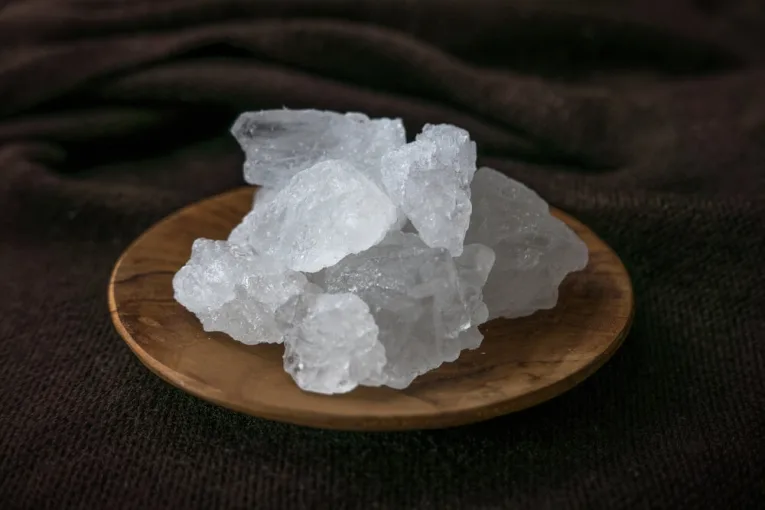Misri, also known as rock sugar, is a traditional natural sweetener made by crystallizing sugarcane juice or palm sap. Unlike refined white sugar, Misri retains trace minerals that make it a gentler and more wholesome option for daily use.
In Ayurveda and Unani medicine, it has long been valued for its soothing and healing properties especially for digestion, energy, and respiratory health.
Today, as people move toward natural and less processed foods, the health benefits of Misri are gaining renewed attention. From sweetening your tea to aiding throat comfort, this age-old ingredient truly earns its place in a balanced diet.
Table of Contents
What Is Misri Made Of?
Misri, or rock sugar, is prepared through a traditional crystallization process that involves boiling and cooling natural sugarcane juice or palm sap. This slow, natural method helps preserve a small portion of the plant’s original nutrients, making Misri a more natural alternative to refined sugar.
How It’s Made:
- Fresh sugarcane juice is boiled to form a thick syrup.
- The syrup is then cooled slowly, allowing large transparent crystals of Misri to form naturally.
- Unlike refined sugar, it usually isn’t bleached or chemically treated.
Nutrient Profile:
🦴 Calcium – supports bone and nerve function.
⚡ Magnesium – aids metabolism and enzyme activity.
💧 Potassium – maintains hydration and muscle health.
🩸 Iron – helps support red blood cell formation.
🌿 Trace minerals – like zinc and phosphorus for overall balance.
Why Misri Is Gentler on Digestion:
Because Misri undergoes minimal processing, it retains small amounts of molasses and minerals that support enzyme function. These traces may help your body digest it more gradually, avoiding the sharp blood sugar spikes often linked to refined white sugar.
Top 7 Proven Health Benefits of Misri
Packed with natural sweetness and trace minerals, Misri (rock sugar) offers several traditional and science-backed benefits when consumed in moderation.
Here are seven key Misri benefits worth knowing:
1. Instant Energy Booster
Misri provides natural glucose, the body’s primary fuel source, offering quick energy after meals, fasting, or physical activity. It replenishes low blood sugar levels naturally without the chemical additives found in processed sugars.
2. Soothes Sore Throat and Cough
Known for its soothing and demulcent properties, Misri helps calm irritation in the throat. When combined with fennel seeds or black pepper, it becomes an age-old home remedy for dry coughs and sore throats.
Tip: Mix crushed Misri in warm water or herbal tea to ease throat discomfort during cold seasons.
3. Improves Digestion
Misri supports healthy digestion by stimulating digestive enzymes and balancing stomach acids. It’s often paired with fennel seeds after meals across South Asia to reduce bloating and acidity.
Tip: Have a small pinch of Misri and saunf (fennel seeds) after meals for smoother digestion and fresher breath.
4. Reduces Stress and Fatigue
The natural glucose and trace minerals in Misri help relax the body and replenish energy lost due to stress or long working hours. In Ayurvedic tradition, it’s also used to promote calmness and better sleep.
5. Supports Healthy Hemoglobin Levels
Misri contains minute traces of iron, which may support hemoglobin production and combat mild fatigue or weakness. While it’s not a replacement for iron-rich foods, it can contribute slightly to daily intake.
6. Improves Oral Freshness
Chewing a small piece of Misri after meals can help neutralize acidity and cleanse the mouth. It leaves a mild sweetness that refreshes breath naturally.
7. Boosts Mental Alertness
The natural sugars in Misri provide a quick energy supply to the brain, enhancing focus, alertness, and cognitive function during long study or work sessions.
Tip: Add a small crystal of Misri to your green tea or lemonade for a natural mental boost.
Misri Benefits for Females
Misri offers several subtle yet valuable health perks for women, especially when used as a natural alternative to refined sugar. Its nutrient profile and gentle sweetness support overall wellbeing during different life stages.
1. Hormonal Balance and Fatigue Relief
During menstrual cycles, the body often experiences fatigue due to fluctuating hormone levels and minor blood loss. The natural glucose and trace iron in Misri help maintain steady energy levels and may ease mild weakness.
2. Improves Skin Glow
The trace minerals like calcium and magnesium in Misri promote collagen function and hydration, which support glowing, healthy skin from within. Regular, mindful use can help combat dullness caused by stress or dehydration.
3. Supports Post-Pregnancy Recovery
After childbirth, many women prefer light, nutrient-rich foods. Misri provides a mild sweetness without processed chemicals, giving quick energy for recovery and lactation support when used in moderation.
Misri Benefits for Males
Men can also benefit from the energy-restoring and stamina-enhancing qualities of Misri. Its natural glucose helps counter physical fatigue and mental burnout.
1. Natural Stamina Booster
Misri helps replenish glycogen levels in the muscles, making it useful after exercise or strenuous work. It delivers quick energy without artificial additives.
2. Improves Mood and Focus
Because the brain runs on glucose, the natural sugars in Misri can enhance mental alertness, focus, and mood especially during long work hours or study sessions.
3. Supports Reproductive Health
In traditional Ayurvedic and Unani practices, Misri is believed to help promote vitality and balance male hormones when used with other natural tonics like ghee or milk. While scientific evidence is limited, its energizing nature supports overall wellbeing.
Tip: Combine small amounts of Misri with milk, dates, and nuts as part of a balanced diet for sustained energy.
Misri Benefits for Skin
Misri isn’t just a natural sweetener. It can also be a gentle and nourishing ingredient for your skin. Thanks to its mineral content and mild texture, rock sugar is often used in natural skincare remedies to hydrate, exfoliate, and brighten the skin.
Hydrates and Revitalizes Skin
Misri has natural humectant properties, meaning it helps draw and retain moisture in the skin. When used topically or consumed moderately, it supports skin hydration and gives a soft, refreshed appearance.
May Improve Dullness
The trace minerals such as calcium, magnesium, and iron found in Misri play a small but vital role in cellular repair and collagen formation. This helps the skin appear more radiant and reduces dullness caused by fatigue or stress.
Used in DIY Scrubs
Powdered Misri acts as a mild natural exfoliant, helping remove dead skin cells without the irritation caused by harsh chemical scrubs. Its crystalline texture smoothens rough patches and enhances blood circulation when massaged gently.
Tip: Mix powdered Misri with rose water to create a gentle, natural facial or body scrub. Use it once or twice a week for soft, glowing skin (for external use only).
Misri vs Sugar: Which Is Better for You?
Both Misri (rock sugar) and refined sugar add sweetness to foods, but they differ significantly in processing, nutritional value, and how they affect your health.
Here’s a simple comparison to help you make the right choice:
| Feature | Misri (Rock Sugar) | Refined Sugar (White Sugar) |
| Processing | Naturally crystallized from sugarcane juice or palm sap with minimal refining | Heavily processed and bleached with chemicals |
| Nutrients | Retains trace minerals like calcium, potassium, and iron | Stripped of all minerals — provides only empty calories |
| Glycemic Index | Slightly lower, offering gradual energy release | High GI — causes quick sugar spikes and crashes |
| Health Impact | Gentler on digestion and slightly easier for the stomach | Linked to weight gain, insulin resistance, and fatigue |
| Taste & Texture | Mild sweetness with mineral undertone | Sharper sweetness, dissolves quickly |
| Traditional Use | Used in Ayurvedic and Unani remedies for energy and digestion | Used mostly for sweetening processed foods |
Best Ways to Use Misri Daily
Incorporating Misri into your routine can add a touch of natural sweetness without resorting to processed sugar. Here’s how to do it smartly:
- Add to milk or herbal tea: Sweeten your drinks naturally while enjoying a calming effect.
- Use in desserts like kheer or halwa: Replaces white sugar for a traditional and wholesome flavor.
- Include in home remedies: Combine with fennel seeds for digestion or with black pepper for throat relief.
- Post-meal mouth freshener: Chew small Misri crystals mixed with saunf to aid digestion and freshen breath.
- Avoid overuse: Misri is still sucrose — diabetics or those managing weight should consume it cautiously.
Possible Side Effects and Precautions
While Misri is often praised as a healthier and more natural alternative to refined sugar, consuming it in excess can still have downsides.
- May lead to tooth decay: Like any sweetener, Misri can promote bacterial growth in the mouth if dental hygiene is neglected. Regular brushing and flossing are essential.
- Can raise blood sugar levels: Although less processed, Misri still contains sucrose. Overconsumption may increase blood sugar and insulin spikes, especially in diabetics.
- Weight management caution: Misri provides calories similar to sugar. People aiming for weight loss should monitor portion sizes.
- Purity matters: Choose organic or unrefined Misri instead of artificially whitened or chemically processed types to ensure natural mineral content and avoid additives.
- Moderation is key: 1–2 teaspoons daily is generally safe for healthy adults, but avoid frequent, large servings.
Key Takeaways
Misri is a minimally processed sweetener that retains trace minerals and offers mild health benefits compared to refined sugar. It aids digestion, boosts energy, and soothes the throat, making it a gentle, traditional alternative for everyday sweetness.
Misri enhances stamina and focus in men, supports hormonal balance and post-pregnancy recovery in women, and promotes a natural skin glow.
Despite its benefits, Misri should be consumed mindfully to prevent sugar-related health concerns.
FAQs About Misri Benefits
Yes, Misri can be used daily in small amounts. It’s a natural sweetener that provides mild energy and digestive benefits. However, like any sugar source, moderation is key, excessive intake can still contribute to weight gain or dental issues.
No, Misri is not recommended for diabetics. Although it’s less processed than refined sugar, it still contains sucrose and can raise blood sugar levels. People with diabetes should consult their doctor before including it in their diet.
Not directly. Misri doesn’t aid in fat burning or metabolism but can be a better alternative to refined sugar for those trying to reduce chemical additives. Still, portion control is essential for maintaining a healthy weight.
Traditionally, Misri is taken with fennel seeds after meals to support digestion. It helps stimulate digestive enzymes, reduces acidity, and soothes the stomach,making it a gentle remedy for mild indigestion or bloating.
Yes, to some extent. Misri’s trace minerals help nourish skin cells and maintain hydration, which may improve skin glow and texture. When used in homemade scrubs, it also gently exfoliates dead cells, promoting a fresher appearance.







.png?t=1626241906)



